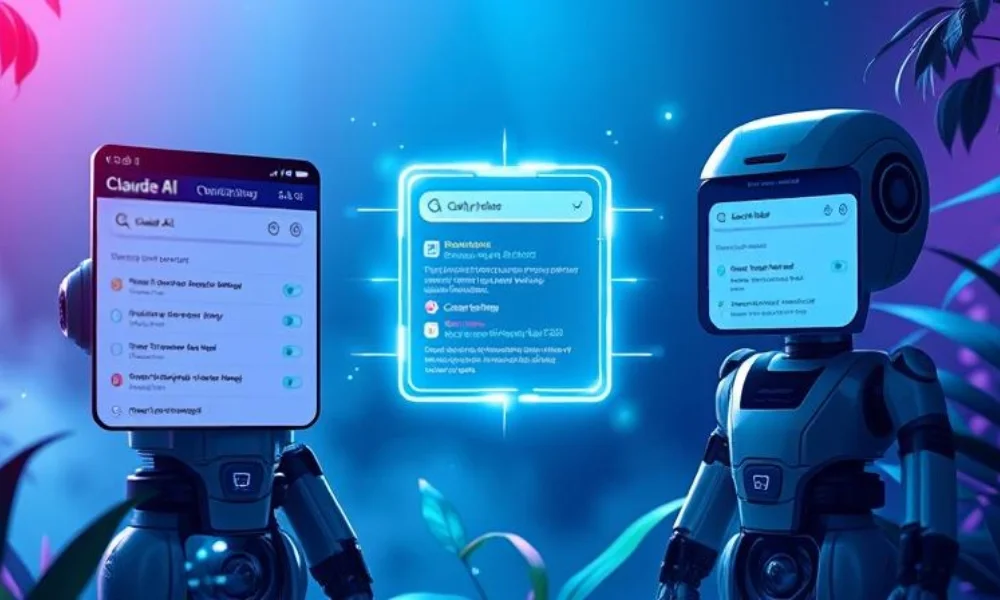Artificial Intelligence
Claude AI vs. ChatGPT: Which Web Search Is More Accurate?
Claude AI and ChatGPT are leading AI-powered search tools, but which one provides more accurate results? This detailed comparison examines their data sources, real-time search abilities, and overall reliability.

AI chatbots serve as the primary online search tool for numerous users although different AI systems deliver variable outcomes in their results. As AI-powered search continues to evolve, users need reliable tools that provide precise and relevant information. The selection of an appropriate chatbot system enables users to retrieve exact answers swiftly.
The experiment measures the accuracy of web search results between Claude AI and ChatGPT to determine the most precise tool. Both chatbots use generative AI and natural language processing to understand queries, but their approaches and accuracy levels differ. Users who understand these differences can select an AI research tool that perfectly matches their requirements.
What Is AI-Powered Search?
AI-powered search uses natural language processing and semantic search to improve web searches. These technologies allow AI chatbots to analyze queries, understand search intent, and provide personalized search results. Some AI research tools even use real-time data to enhance accuracy.
My research will explore the data retrieval methods of each chatbot together with their data sources and accuracy levels along with real-world implementation outcomes. The comparison enables users to select the AI tool that delivers optimal results based on relevance and trustworthiness in their searches.
How Claude AI and ChatGPT Perform Web Searches?
AI-powered search has changed how we find information online. Claude AI and ChatGPT both use generative AI to process search queries, but they have different approaches. Users can select appropriate AI research tools by studying how their systems collect and retrieve data.
What Data Sources Do Claude AI and ChatGPT Use?
User queries lead to different datasets being used by Claude AI and ChatGPT. ChatGPT draws its information from a pre-trained database containing research papers research papers and web content stopping at a particular time limit. Live web search results are inaccessible to Claude AI unless the user connects to its browsing feature.
The dataset training of Claude AI by Anthropic includes pre-trained material alongside curated content. The restricted web access features of certain Claude AI versions enables the system to retrieve updated information. The distinction leads to variations in accuracy and freshness when responding to users.
How Do They Process Search Queries?
Both AI tools use natural language processing to understand user intent. The search queries which ChatGPT processes stem from its analysis of established patterns present in its training database. The system uses previous data patterns to generate its most suitable response instead of obtaining new information.
Claude AI follows a similar approach but prioritizes semantic search techniques. The system works to decode the underlying purpose of user inquiries instead of focusing on keyword matching. The approach leads to better response relevance when dealing with complex subjects.
Do They Retrieve Real-Time Web Data or Rely on Pre-Trained Knowledge?
ChatGPT’s free version does not retrieve real-time data. Premium versions of these systems enable users to access current web search results through their browsing capabilities. The application allows users to obtain current data whenever they require it.
Claude AI has limited real-time data retrieval, depending on its version. The different versions of these programs either grant users web access or depend exclusively on information their systems learned in advance. The ability to conduct real-time searches depends on which AI tool a user selects with live browsing capabilities.
Claude AI: Can It Search the Web?
The web searching capability of Claude AI depends on the specific version users have access to. Many users rely on AI-powered search for up-to-date information, so it’s important to know whether Claude AI can access real-time data. Understanding its sources and accuracy verification can help determine its reliability for web search evolution.
Does Claude AI Have Live Web Access?
Most versions of Claude AI do not allow users to access live web content. Its main functionality differs from standard search engines because it depends primarily on pre-trained knowledge. The advanced versions include minimal web browsing features though they operate differently from typical web search engines.
Without real-time data retrieval, Claude AI may not always provide the latest information. Users who need up-to-date breaking news or AI research publications will obtain inaccurate results unless web access becomes available.
What Sources Does It Use for Generating Responses?
Claude AI produces responses through a combination of organized datasets along with unorganized information sources. Its training data includes books along with articles and carefully selected web content which enables it to handle complicated subjects. The system fails to reveal its information sources so users cannot confirm its reliability.
Some responses may be influenced by semantic search techniques, helping Claude AI predict relevant answers. The lack of continuous web updates in Claude AI results in its knowledge becoming outdated as time passes.
How Does It Verify Accuracy?
Real-time fact-checking is not a capability of Claude AI. The system depends on a combination of pre-taught information together with statistical prediction methods. The system produces correct results through its analysis of standard patterns found in trustworthy information sources.
The absence of live verification allows Claude AI to generate information that might be incorrect or out of date. Users should cross-check critical details using AI research tools that support real-time search.
Example Test: Searching for the Latest AI Research
I conducted a testing process on Claude AI by searching for recent breakthroughs in AI research. The response provided general trends in generative AI and natural language processing but lacked recent developments. Since Claude AI does not browse real-time sources, it could not provide information on the latest AI-powered search innovations.
This test shows that while Claude AI is useful for historical and conceptual knowledge, it is not the best tool for retrieving up-to-the-minute research.
ChatGPT: How It Handles Web Searches
ChatGPT is widely used for AI-powered search, but its ability to retrieve real-time data depends on the version. Many users rely on it for web search evolution, so understanding how it retrieves and filters information is important. The browsing feature serves as the main instrument for boosting accuracy while maintaining relevance.
Does ChatGPT Have Real-Time Search Capabilities?
The ability of ChatGPT to search in real time depends on whether the browsing function is active. Free users of ChatGPT must use pre-trained knowledge because the system blocks access to current web data. The premium version of ChatGPT Plus with GPT-4 incorporates a browsing feature which enables it to retrieve current internet-based information.
With real-time data access, ChatGPT can answer time-sensitive queries more effectively. The browsing feature provides better usefulness to users who need immediate access to AI research updates and financial market trends alongside breaking news.
How Does ChatGPT Retrieve and Filter Data?
The system produces responses from pre-existing information after disabling the browser function. It uses natural language processing and semantic search techniques to predict relevant answers. The system delivers excellent results for common subjects although it does not always offer recent information.
When browsing is enabled, ChatGPT retrieves real-time data from indexed websites. The system looks through multiple sources to pull significant details before discarding content that does not apply. This approach improves the accuracy of time-sensitive responses while maintaining search intent relevance.
What Role Does Its Browsing Feature Play?
The browsing feature enables ChatGPT to act as an artificial intelligence tool that performs research. The search accuracy improves because the tool retrieves information from reliable websites. ChatGPT differs from conventional search engines because it performs result analysis and summary generation rather than showing standard link results.
Browsing also improves personalized search by adapting responses based on user queries. Users need to check essential information because AI summary outputs might exclude vital details that appeared in the original sources.
Example Test: Searching for Recent Tech News
My research inquiry for recent tech news served as the test for ChatGPT’s web search function. Without browsing, the response provided general trends in generative AI and natural language processing but lacked real-time updates. Browsing enabled the system to obtain news from respected sources while delivering precise summaries of important details.
This test shows that ChatGPT’s browsing feature significantly improves its ability to provide real-time data. Users requiring current information should choose a version with web access to achieve superior outcomes.
Accuracy Test: Which AI Gives More Reliable Results?
AI-powered search tools like Claude AI and ChatGPT are designed to provide accurate information, but their reliability can vary. Through using identical queries I conducted tests to determine which AI system provided superior outcomes. The evaluation assesses how fast the systems respond and how clear their results are and how accurate their facts remain in practical searches.
Methodology: Testing Identical Queries on Both AI Tools
Three test queries which represented various information types included industry trends together with real-time events and future predictions. The same queries went into both Claude AI and ChatGPT during their evaluation. Responses were analyzed based on accuracy, search intent relevance, and response clarity.
I operated Claude AI using a standard version that lacked web access because it does not support real-time searches. I conducted tests on ChatGPT using its standard version along with its browsing-enabled version to understand the variations between them.
Comparison: Speed, Clarity, and Factual Accuracy
The rapid query processing of both Claude AI and ChatGPT resulted in different response qualities due to their methods of retrieving data. Real-time searches produced their quickest and most precise results through ChatGPT when it had browsing capabilities enabled. Although Claude AI delivered organized responses it occasionally missed recent information in its output.
-
Speed: Both tools generated responses in seconds, but browsing-enabled ChatGPT took slightly longer due to live web searches.
-
Clarity: Both AI tools presented information in an easy-to-read format, but ChatGPT structured its responses with more direct answers.
-
Factual Accuracy: ChatGPT with browsing was more accurate for time-sensitive queries, while Claude AI provided reliable but sometimes outdated insights.
Example Queries and Results:
Query 1: “Latest trends in AI safety”
-
Claude AI: Provided an overview of general AI safety principles, such as ethical AI and bias reduction. However, it lacked recent developments from 2024.
-
ChatGPT (no browsing): Gave similar insights but mentioned past discussions from AI research papers.
-
ChatGPT (with browsing): Retrieved real-time information on current AI safety discussions, citing reports from 2024.
Winner: ChatGPT with browsing, due to up-to-date insights.
Query 2: “Who won the 2024 Super Bowl?”
-
Claude AI: Could not provide an answer, as it lacked real-time web access.
-
ChatGPT (no browsing): Also could not answer, relying on outdated knowledge.
-
ChatGPT (with browsing): Pulled the latest Super Bowl winner’s name from news sources.
Winner: ChatGPT with browsing, as it retrieved real-time results.
Query 3: “Best programming languages for 2025”
-
Claude AI: Provided a well-structured response based on past programming trends, mentioning Python, JavaScript, and Rust as top contenders.
-
ChatGPT (no browsing): Gave a similar response, predicting future trends based on previous years.
-
ChatGPT (with browsing): Retrieved the latest programming language rankings and trends from 2024, offering a more data-driven answer.
Winner: ChatGPT with browsing, for providing the most updated predictions.
Final Verdict: Which AI Is More Reliable?
The performance of Claude AI and ChatGPT matched when dealing with standard information and predefined answers. Real-time searches and fact-checking tasks were better handled by ChatGPT when it had browsing access enabled. To achieve accurate current information users should activate the browsing option.
Sources and Citation Quality: Do They Provide Credible References?
AI-powered search tools help users find information quickly, but credibility depends on their sources. A reliable AI should cite references, provide verifiable data, and maintain search intent accuracy. I examined if Claude AI and ChatGPT provide references which support their generated responses.
Does Claude AI Cite Sources?
The responses Claude AI produces stem from its trained database although the system fails to provide direct references. The system provides generalized summaries when asked for sources but never includes particular references. This can make it difficult to verify details, especially for complex topics like AI research tools or web search evolution.
However, Claude AI attempts to ensure accuracy by using semantic search techniques. The system provides logical response organization and prevents speculative answers which increases the reliability of its output. Users need to verify essential information using outside resources even after using Claude AI.
Does ChatGPT List References or Links?
The capability of ChatGPT to generate citations depends on whether the system allows browsing functions. When web access is disabled the system fails to show references and operates based on its pre-trained knowledge base like Claude AI. A user must perform outside research to verify the information because the system presents organized details without direct references.
With browsing enabled, ChatGPT can retrieve real-time data and sometimes includes links to sources. The citation quality improves through this feature although it fails to provide direct references for every query. The provided summarized insights from ChatGPT do not contain clickable links which prompts users to perform manual fact-checking.
Which AI Tool Gives More Verifiable Information?
To compare their citation quality, I tested both AI tools with fact-based queries requiring clear references.
-
Claude AI: Provided accurate general knowledge but did not include direct citations.
-
ChatGPT (no browsing): Delivered structured responses but lacked verifiable sources.
-
ChatGPT (with browsing): Retrieved updated information and sometimes referenced sources, but links were not always included.
Winner: ChatGPT with browsing access, as it offers the highest chance of retrieving verifiable sources. However, neither AI consistently provides direct citations, so users should cross-check important details manually.
User Experience: Which AI Is Easier to Use?
AI-powered search tools should deliver clear, readable responses while providing a smooth user experience. I compared Claude AI and ChatGPT based on response clarity, interface usability, and additional features.
Response Clarity and Readability:
Both AI tools generate human-like responses, but their writing styles differ.
-
Claude AI: Provides well-structured, detailed answers with a professional tone. Its responses are slightly longer but easy to understand.
-
ChatGPT: Uses a conversational and engaging style. It breaks down complex topics into simple explanations, making content more digestible.
Winner: ChatGPT, for its more natural and engaging tone.
Interface and Usability Differences:
The interface plays a big role in how easy an AI tool is to use.
-
Claude AI: Has a clean, minimalistic interface with a focus on text-based conversations. It supports longer responses without requiring multiple prompts.
-
ChatGPT: Features a user-friendly design with smooth navigation. It allows users to refine queries easily and adjust conversation context for better responses.
Winner: ChatGPT, for a more interactive and flexible interface.
Additional Features:
Modern AI tools go beyond answering questions by offering extra features.
-
Claude AI: Excels at summarization and breaking down complex topics. However, it lacks strong follow-up capabilities for refining responses.
-
ChatGPT: Supports follow-up questions, allowing users to adjust search intent and receive more tailored answers. It also integrates browsing (in Pro versions) for real-time data access.
Winner: ChatGPT, for its ability to handle follow-ups and refine searches.
Final Verdict: Which AI Provides a Better User Experience?
Claude AI is great for structured responses, but ChatGPT offers better usability, readability, and interaction. Users looking for an intuitive, easy-to-use AI search tool will find ChatGPT more convenient.
Verdict: Which AI Wins the Web Search Accuracy Battle?
Both Claude AI and ChatGPT are powerful AI-powered search tools, but their accuracy depends on how they retrieve and process information. After testing both, I identified their strengths, weaknesses, and the best option for reliable web searches.
Strengths and Weaknesses of Claude AI:
Strengths:
-
Generates well-structured, detailed responses.
-
Uses semantic search to provide logical, fact-based answers.
-
Excels at summarization and breaking down complex topics.
Weaknesses:
-
Lacks real-time web access, relying on pre-trained data.
-
Does not provide direct citations or links to sources.
-
Struggles with rapidly changing information, such as live events or recent AI research.
Strengths and Weaknesses of ChatGPT:
Strengths:
-
Offers a conversational and engaging tone, making answers easier to read.
-
Allows follow-up questions for refining search intent.
-
With browsing enabled, it can retrieve real-time data and sometimes provide source links.
Weaknesses:
-
Without browsing, it relies on pre-trained knowledge, leading to outdated information.
-
Source citations are inconsistent, and not every response includes verifiable references.
-
Some answers may be too general without deeper insights into niche topics.
Final Thoughts on the Best Tool for Accurate Searches:
The reliable output of Claude AI works for basic knowledge retrieval and summary generation while it does not include live web search functions. ChatGPT with browsing enabled stands as the better choice for tasks needing real-time accuracy. Users must verify important facts with established information sources because these AI systems are not flawless in their operations.
Winner: ChatGPT with browsing, for its ability to access real-time data and refine responses through follow-ups.
Conclusion:
Claude AI and ChatGPT both offer valuable AI-powered search capabilities, but their accuracy depends on data sources, search intent processing, and real-time access. The results from my tests indicated ChatGPT delivers superior performance with browsing activated yet Claude AI produces its best results from well-structured information.
Recommendation for Different Use Cases:
-
For general knowledge and structured summaries: Claude AI provides clear, detailed explanations but lacks real-time web access.
-
For real-time searches and follow-up questions: ChatGPT with browsing enabled is the better choice, as it retrieves up-to-date information.
-
For users who prefer engaging, easy-to-read responses: ChatGPT delivers more conversational and user-friendly answers.
Both AI tools have strengths and weaknesses, so the best choice depends on your search needs.
Which AI do you trust more for web searches? Share your thoughts in the comments!
-

 Artificial Intelligence8 months ago
Artificial Intelligence8 months agoWhat is Artificial Intelligence? A Comprehensive Guide for Businesses and Enthusiasts
-

 Artificial Intelligence6 months ago
Artificial Intelligence6 months agoHow to Use Grok AI: A Complete Guide
-

 Artificial Intelligence8 months ago
Artificial Intelligence8 months agoUnlocking the Power of Artificial Intelligence Tools
-

 Artificial Intelligence7 months ago
Artificial Intelligence7 months agoWhat is DeepSeek? Revolutionizing AI with Cutting-Edge Solutions
-

 Artificial Intelligence3 months ago
Artificial Intelligence3 months agoAI Technologies in Warehouse Automation:
-

 Artificial Intelligence4 months ago
Artificial Intelligence4 months agoMeta’s AI Push: The Standalone Assistant App Set to Rival ChatGPT
-

 Artificial Intelligence3 months ago
Artificial Intelligence3 months agoHow Artificial Intelligence is Revolutionizing Logistics:
-

 Artificial Intelligence3 months ago
Artificial Intelligence3 months agoPredictive Analytics for Demand Forecasting:


